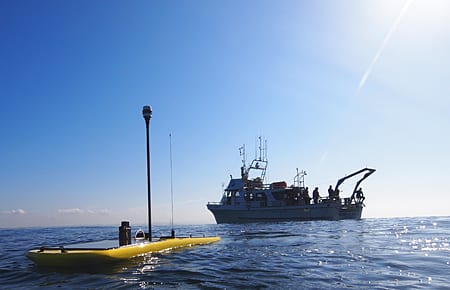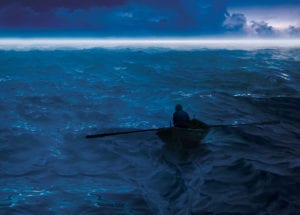By Daniel de la Calle
Information and communication, going hand in hand as should be:
»Lecture near Lake Tahoe: Dr. Howard Spero, UC Davis, will deliver a lecture titled Changing Seas about the earth’s climate, climate change throughout history and ocean (and Lake Tahoe) acidification. The date is March 22nd at 5:30PM and the location the Tahoe Center for Environmental Sciences, 291 Country Club Drive, Incline Village.
SOURCE
»Four wave glider robots made by Liquid Robotics have broken the world distance traveled by unmanned wave power vehicles record by covering over 3,200 nautical miles from San Francisco to Hawaii. The drones consist of an underwater glider that is attached by a cable to a floating section. They convert the endless motion of the oceans into forward thrust, allowing them to travel thousands of miles with no fuel consumption. These new generation of robots are capable of monitoring everything from shrinking fisheries or natural disasters to Ocean Acidification.
Photo credit: Liquid Robotics
SOURCE
»Audio story on Ocean Acidification along the shores of the West Coast by APRN’s Steve Heimel. Heimel looks at the circulation patterns that may already be acidifying fish habitat in the Arctic.
AUDIO and SOURCE
»“In order to develop consistent messaging and education and communication tools for ocean acidification, the West Coast National Marine Sanctuaries are partnering with the Monterrey Bay Sanctuary Foundation and Monterrey Bay Aquarium Research Institute to host an Effective Practices for Ocean Acidification (OA) Communication and Education workshop. This workshop is planned to take place in conjunction with and immediately following the International Science Symposium, The Ocean in a High CO2 World: Ocean Acidification, in Monterrey in September 2012.
[…]
Following the workshop, the NOAA OA Education working group will develop a National NOAA OA Education Action Plan, which will incorporate some of the results and outcomes from the Effective Practices Workshop.
Topics to be covered during the workshop will include the following:
• Development and implementation of effective messaging
• How to frame messaging for varying audiences
• Linkage of science to education and outreach
• Creation of a resource inventory to bring together scientific information with educational tools
• The scope of the problem and its relation to west coast sanctuary and estuary sites and regional as well as national issues
• Research linkages and regionally relevant case studies including how tangible resource impacts may affect local economies.”
»The Darwin Center for Biogeosciences will have a Summer School Program in Utrecht and Texel, the Netherlands, July 1st-12th, 2012. “Main subjects will be Ocean Acidification, the carbon cycle, microbial ecology, biomarkers, terrestrial carbon cycling and climate reconstructions in the past, present and future.”
More INFO and SOURCE
»The British Oceanographic Data Centre has announced the launch of the data management area for the UK Ocean Acidification (UKOA) research program. UKOA is a five-year, £12 million research program that started in 2010 and involves 27 institutes in the UK and has close links to other similar programs around the world.
How to gain access UKOA data HERE
SOURCE


